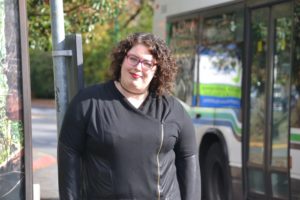Camosun College students will have a say on the Victoria Transit Commission (VTC) board this year. Camosun College Student Society (CCSS) external executive Rachael Grant currently holds the student representative position on the VTC board; last year, the position was held by Kenya Rogers, then University of Victoria Students’ Society (UVSS) external executive (the two student societies alternate having a representative on the board every year).
The position does not have voting power, but Victoria Transit Commission chair Susan Brice says that the commission has been well served by the students.
“We knew that they would have valuable input in student issues—that goes without saying—but we have found them to be just full and valuable members of the commission,” says Brice.

Last year, Rogers brought forward a motion that would give all incoming Syrian refugees in Greater Victoria a free one-year bus pass; she hopes that it will be mandated when it comes up for review.
“It doesn’t necessarily directly pertain to students, but it was something brought to the table by the student rep at the time,” says Grant.
The student representative position has also brought up issues around transit safety, resulting in an installation of security cameras on buses. Rogers says that the topic came up when talking to Unifor Local 333, the union that represents Greater Victoria bus drivers, about drivers’ safety while advocating for longer transit hours.
“The service hours that exist right now aren’t conducive to students being able to get home safe from downtown on the weekends,” says Rogers. “If you work in the service industry, or if you want to stay for last call, there’s not that many buses that will get you home. We dropped off over 5,000 signatures—postcards that were written for the transit commission—asking for late-night transit.”
Brice says that there’s currently a request in with the government for a two-cent increase to the gas tax to help BC Transit get the funding that they need to increase late-night hours.
Even though the student representative can’t vote, Brice says that since the commission is a small group, every voice has an equal weight in the discussion.
“We are a group that tends to build by consensus,” she says, “rather than just necessarily by vote.”
But both Grant and Rogers say that the position needs to be one with voting power.
“That would be a meaningful statement that students are an important part of transit in the Greater Victoria area,” says Grant.
Addressing buses passing by students is an ongoing issue that continues to be brought up in meetings.
“Pass-ups have been a problem for a really long time,” says Grant. “One interesting thing about being on the commission is learning in a lot more detail why that is the case. It’s much more complex than just adding more buses to a route. It’s often an issue of not enough government funding. No one likes to be passed up when they’re trying to get to their class. It’s frustrating. It’s talked about at every meeting and there are efforts being made to address it.”
The Victoria Transit Commission had supervisors on the buses during the first week of classes to talk to students and gather information.
“I was grateful for that because it wasn’t just a matter of getting statistics on a sheet,” says Brice. “I was able to talk to senior staff who had actually been on the bus that morning and seen the pass-ups.”
This year, Grant is working on getting a discount bus pass for students during the summer months. For now, Brice—who says that she hopes that students can appreciate that the UPass rates stayed the same during the recent transit-fare review—says that the student voice is valued.
“We’re always interested in hearing first-hand any issues and recognize that students, like everybody else, have busy lives,” says Brice. “Hopefully, we’re representing their needs, but there’s always an option to write to the commission or come down to a commission meeting.”
